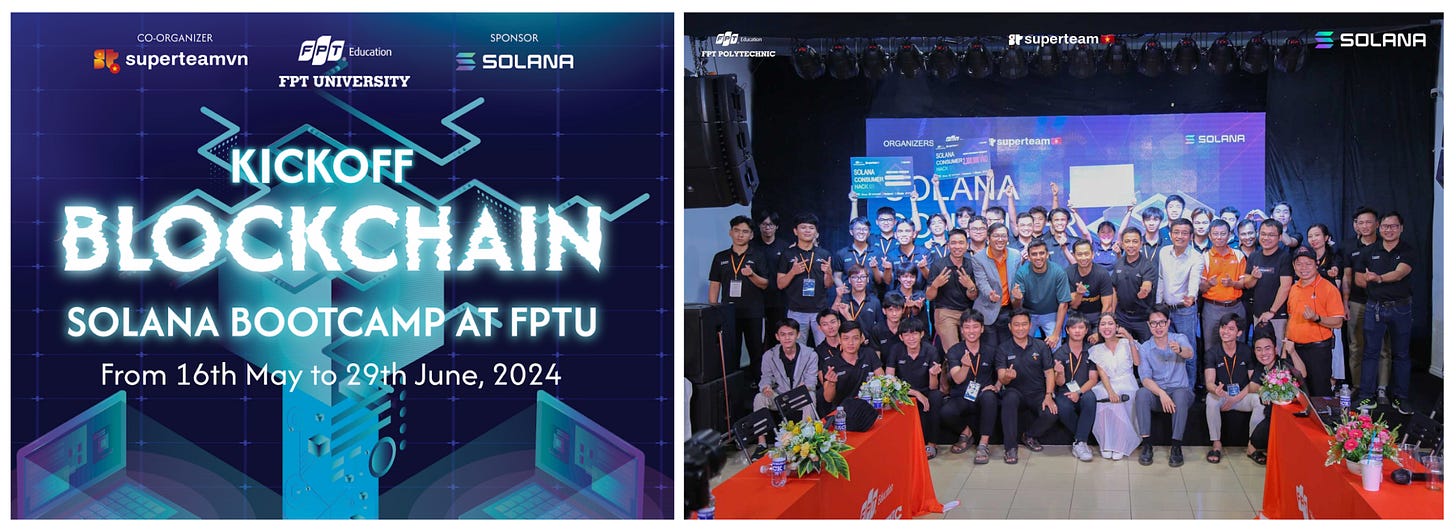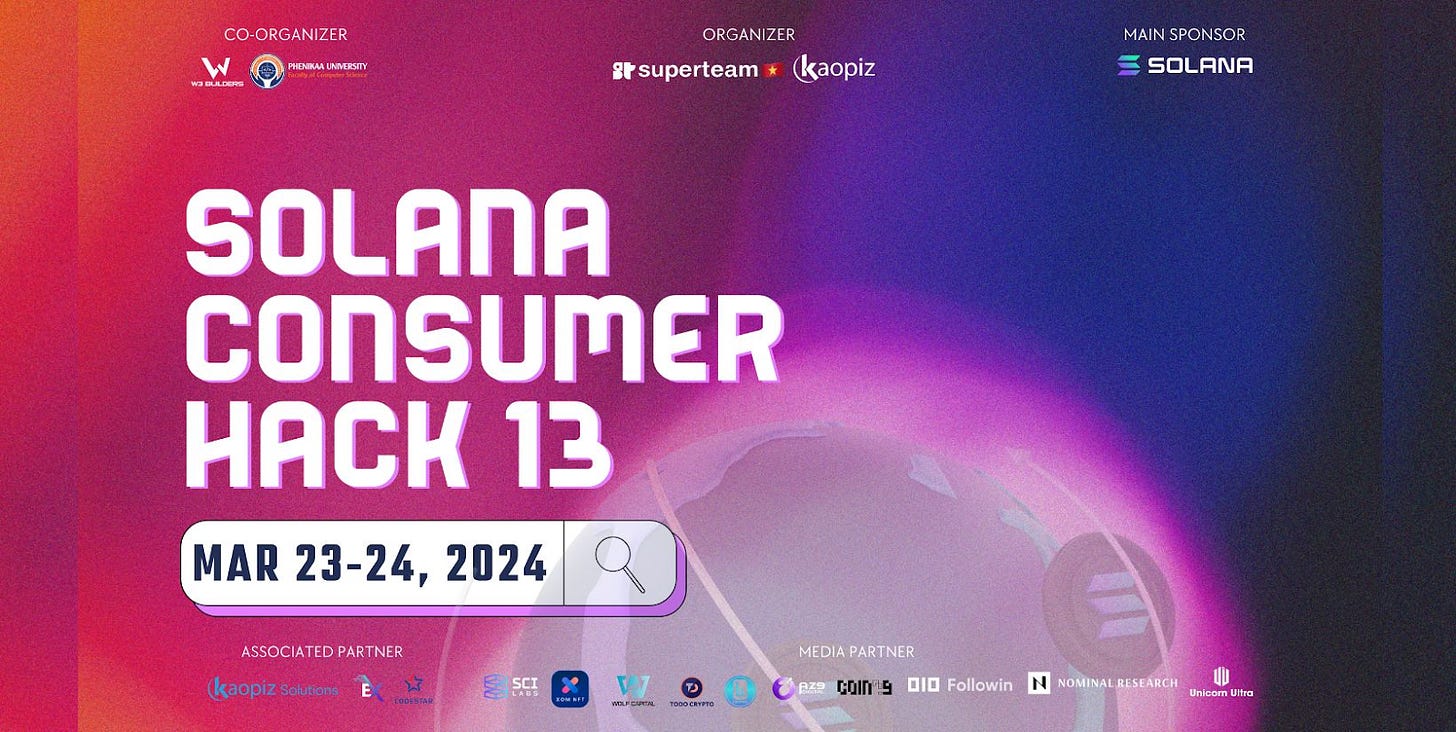
Vietnam's Blockchain Frontier: Nurturing the Next Generation of Developers
How is Vietnam fostering the future of blockchain developers?
TL;DR
Despite limited formal blockchain education, Vietnam has become a blockchain leader, driven by a strong developer community and various informal learning paths.
Regulatory uncertainty and a lack of mentors challenge the developer ecosystem, but the government's digital transformation efforts and the growing blockchain industry are expected to independently foster structured training programs.
These developments are expected to enhance Vietnam's ability to cultivate and attract skilled blockchain developers, further establishing its role as a leading digital technology hub.
1. Introduction
As blockchain technology gains global traction, Vietnam is emerging as a promising market, largely due to its rich pool of development talent. Remarkably, despite the lack of formal blockchain education programs, Vietnam is establishing itself as a leader in this field. Vietnamese blockchain developers are navigating these educational gaps by developing their skills through self learning and hands-on experience.
This report examines Vietnam's unique development ecosystem, highlighting how it is fostering developers who are competitive on the global blockchain stage and projecting its future growth potential.
2. The Engine of Vietnam’s Tech Growth
Vietnam's IT market is witnessing remarkable growth, fueled by a tech-savvy younger generation. A previous report, "SEA Blockchain Developer Ecosystem" report highlights that Vietnam boasts the largest number of developers among Southeast Asian countries. Furthermore, the Vietnam Tech Talent Report 2023, published by TopDev, a leading Vietnamese IT recruitment platform, underscores Vietnam's significant standing in the global IT landscape. The report reveals that Vietnam ranks as the world's second-largest provider of software outsourcing services and is home to one of the top 10 developer pools globally.
Vietnam's abundant IT talent pool is not a temporary phenomenon but a steadily growing one. With 530,000 IT professionals—the largest pool in Southeast Asia—Vietnam adds 50,000 to 60,000 new tech talents annually. This growth highlights the strong focus of Vietnam's education system on developing IT expertise.
Notably, 85% of these graduates hold a bachelor's degree or higher in IT or related fields, highlighting the high level of education and professionalism among Vietnamese tech graduates.
A distinctive feature of Vietnam's tech talent is its youthful age distribution, with developers aged 20 to 34 driving the industry forward. These young professionals are at the forefront of innovation, particularly in emerging technologies such as blockchain. Their pioneering spirit bodes well for the future of Vietnam's IT industry, signaling continued growth and technological advancement.
3. Educational Pathways for Vietnam’s Blockchain Developers
Interest in blockchain technology is surging in Vietnam, yet the lack of formal training programs means that much of the country's tech talent is self-taught. While institutions like RMIT University in Vietnam offer blockchain-related courses, these programs are primarily focused on the business aspects of the technology and lack the in-depth technical training that developers require.
In response, blockchain developers in Vietnam are actively pursuing non-traditional educational paths. In particular, many are acquiring the necessary skills through self-study using online resources, participating in offline workshops, and attending seminars. This approach underscores the enthusiasm and adaptability of Vietnamese developers.
3.1. Digital Learning Platforms
Vietnamese developers utilize a wide range of educational platforms to enhance their blockchain skills. They utilize global online education platforms like Udemy, Coursera, LinkedIn Learning, and FreeCodeCamp, as well as YouTube channels that offer extensive tutorials and coding resources.
Learning through local online education platforms is also a growing trend. Platforms like 200Lab in Vietnam offer specialized blockchain courses tailored to the Vietnamese market, covering the latest trends and practical skills. In addition to blockchain, these platforms provide a variety of development-related training, further enhancing the overall technical competency of developers.
In response to the lack of formal blockchain education in universities, several coding bootcamps have emerged across Vietnam, offering intensive, hands-on training. OpenEdu101 stands out as a leading e-learning hub, providing bootcamps in trending programming languages like Rust and Move, which are essential for blockchain development. These bootcamps are tailored to equip participants with the practical skills necessary to thrive in the rapidly evolving blockchain industry.
3.2. On-the-Ground Learning

While online training platforms in Vietnam are rapidly enhancing developers' skills, the growth of offline training centers is further enriching the educational landscape. Leading centers such as MindX and VTI Academy are at the forefront, providing hands-on experience and comprehensive training for blockchain developers. These centers effectively bridge the gap between theoretical knowledge and practical application by offering collaborative learning environments that simulate real-world work settings and encourage a participatory approach to education.
MindX, which recently secured $3 million in funding, emphasizes deep-tech skills, including blockchain, equipping Vietnamese students with the practical abilities needed to excel in the industry. As this trend continues, more IT training centers are expected to integrate blockchain technology into their curricula, further broadening the scope of tech education in Vietnam.
In addition, Solana partnered with FPT University in Vietnam to organize the Solana Bootcamp. This bootcamp serves as a prime example of university-industry collaboration, offering students cutting-edge blockchain education and making a significant contribution to Vietnam's evolving Web3 education landscape.
4. Community-Led Initiatives in Vietnam’s Blockchain Sector
As blockchain technology evolves, the ecosystem is growing more diverse and complex. In response, Vietnamese developers are increasingly focusing on learning and growth through community involvement. This shift has led to the emergence of developer-centric communities, primarily through 1) local meetups and 2) hackathons and competitions. These activities are vital for enhancing the skills of Vietnamese blockchain developers and driving ecosystem growth, further establishing Vietnam as a key talent pool in the global blockchain market.
4.1. Building Networks: Local Communities and Meetups
Local developer communities play a crucial role in fostering blockchain development in Vietnam. Regular meetups and events provide a platform for developers to share knowledge, collaborate on projects, and stay updated on industry trends. Communities such as DoraHacks and Web3 Saigon have been instrumental in building a supportive network for blockchain enthusiasts and professionals.
4.2. Sparking Innovation: Hackathons and Competitions
Hackathons and competitions are vital in nurturing blockchain talent and innovation. Events like the Vietnam Rust Hackathon and the Solana Hackathon offer developers the opportunity to tackle real-world challenges, experiment with new ideas, and gain recognition within the industry. These events encourage creativity and help developers build practical experience through showcasing their skills to potential employers and investors. Most hackathons are hosted by major blockchain projects but rely heavily on local communities for effective distribution and engagement. For instance, the Solana Hackathon was organized by Solana but co-hosted by Solana Superteam, a prominent community of Solana enthusiasts in Vietnam.
The emphasis on community-led initiatives in Vietnam’s blockchain sector highlights the collaborative spirit driving innovation. Local developer communities and meetups promote knowledge sharing and networking, providing a solid foundation for nurturing blockchain talent. Additionally, hackathons and competitions offer developers valuable real-world problem-solving experience and recognition within the industry.
These factors make Vietnam an ideal market for Web3 companies looking to host events and competitions. The active blockchain community and tech-savvy population create an optimal environment for fostering innovation, enhancing brand visibility, and establishing key industry partnerships. As a result, Vietnam is emerging as a central hub for blockchain technology advancement.
5. Closing thoughts
Vietnam's blockchain development capacity holds significant potential and promise, but it also faces several challenges. The lack of formal education and standardized curricula has resulted in developers with varying levels of expertise, and the shortage of experienced mentors has slowed the growth of young tech talent.
However, as the blockchain industry matures and becomes more mainstream, the emergence of structured training programs is expected to drive the rapid growth of blockchain technology talent in Vietnam. Additionally, the government's increasing focus on promoting innovation and digital transformation is likely to result in clearer regulations and policies, creating a more supportive environment for blockchain growth.
In conclusion, while Vietnam's blockchain development still faces hurdles, the opportunities ahead are vast. With ongoing support from educational institutions, industry stakeholders, and the government, Vietnam is well-positioned to play a significant role in the global blockchain landscape and establish itself as a future hub for blockchain technology.
🐯 More from Tiger Research
Read more reports related to this research.Disclaimer
This report has been prepared based on materials believed to be reliable. However, we do not expressly or impliedly warrant the accuracy, completeness, and suitability of the information. We disclaim any liability for any losses arising from the use of this report or its contents. The conclusions and recommendations in this report are based on information available at the time of preparation and are subject to change without notice. All projects, estimates, forecasts, objectives, opinions, and views expressed in this report are subject to change without notice and may differ from or be contrary to the opinions of others or other organizations.
This document is for informational purposes only and should not be considered legal, business, investment, or tax advice. Any references to securities or digital assets are for illustrative purposes only and do not constitute an investment recommendation or an offer to provide investment advisory services. This material is not directed at investors or potential investors.
Terms of Usage
Tiger Research allows the fair use of its reports. ‘Fair use’ is a principle that broadly permits the use of specific content for public interest purposes, as long as it doesn't harm the commercial value of the material. If the use aligns with the purpose of fair use, the reports can be utilized without prior permission. However, when citing Tiger Research's reports, it is mandatory to 1) clearly state 'Tiger Research' as the source, 2) include the Tiger Research logo, and 3) incorporate the original link to the report. If the material is to be restructured and published, separate negotiations are required. Unauthorized use of the reports may result in legal action.












